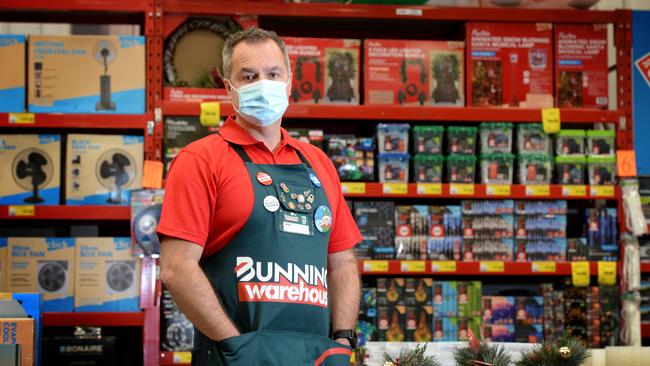Consumers showing a growing sense of ‘confidence and optimism’ amid inflationary pressures: Wesfarmers’ Rob Scott
Shoppers are back and keen for value just as businesses are needing to find ways to pass on increased costs, says the boss of Wesfarmers, which owns Bunnings, Target and Officeworks.

Australian businesses are seeing a greater sense of “confidence and optimism” among consumers, but they see inflationary pressures on the rise, according to Wesfarmers chief executive Rob Scott.
“Unemployment is low, household savings are high,” he told a business conference in Sydney on Wednesday.
“I think we can look forward to the rest of this year, domestically at least, with a growing sense of confidence.”
But Mr Scott, whose Perth based conglomerate owns businesses including Officeworks, Bunnings, Kmart, Target and Catch.com.au, said consumers and businesses were also having to deal with higher inflationary pressures.
Businesses, particularly those in Western Australia, were also facing higher wage pressure for staff in specialist areas like IT and engineering as a result of a shortage of skilled workers in certain sectors.
“Across most of Australia as restrictions ease and markets start to open up, we are seeing increased business and consumer activity,” he said.
“There has been a real pick-up recently as people start to look forward with a sense of optimism about the future.”
He said while the average increase in real wages was not strong, there was a very different picture with some critical roles in technology, supply chain and some of the major project development roles needed in Western Australia.
“We are seeing shortages in availability of labour and some pretty significant wages pressure.”
He contrasted his experience with comments by Reserve Bank governor Phil Lowe to the same conference that wages growth in Australia had remained modest.
Mr Scott said a lot of Australian companies had supported their staff through Covid-19 with paid leave and other assistance, which was also adding to costs.

He said businesses were now being forced to pass on higher cost pressures to customers.
“We are seeing more cost pressure now than we were six months ago,” he said.
“For some of our businesses, which are involved in the manufacture and sourcing of products, which will turn up on our shelves in six to nine months’ time, we are seeing (cost) pressure that will flow through for the rest of the year.”
He said he felt that most businesses were now “quite pragmatic” about increasing costs if they faced higher input costs.
“If your costs are going up, you will find a way to try and pass those on.”’
But he said that he expected that consumers would start becoming more cost conscious in future as they emerged from the pandemic.
“This has been quite an unusual period through Covid with high levels of household savings.”
“Going forward, value will become more important.”
Mr Scott urged whichever party won the upcoming federal election to be prepared to tackle industrial relations reform across the country.
He said reforming the current enterprise bargaining system was a key issue which was needed to provide more flexibility in the system and provide benefits for both workers and employers.
He said the current “better off test” meant that there could be no changes to enterprise bargains unless it could be shown that there was no single employee who might be worse off.
He said this was making it very difficult to change enterprise bargain agreements which were in the overwhelming benefit of most of the workers involved.
Mr Scott’s Wesfarmers group is one of the largest private sector employers of labour in the country.
He said other reforms were needed including tax reform and the elimination of duplication of “overlapping and inconsistent regulation” across jurisdictions in Australia.
But he said there was never overwhelming public demand for these reforms.
“It’s going to take some political courage (to make these changes), whoever ends up winning the election,” he said.
The chief executive of the Business Council, Jennifer Westacott, said the BCA wanted to see the federal government allow a “catch up on immigration” of another 220,000 people a year over the next few years.
The pre-Covid level was running at around 160,000 a year.
She said the Australian economy was some 300,000 workers short of what was needed.
“We are about 300,000 workers down,” she said.
“There isn’t a business in this room that isn’t talking about labour shortages.”
“Business investment fell again last week because companies can’t get the labour to do this.”
She said it was already evident that there were severe labour shortages because of the floods in NSW.
She said some foreign companies were now wary of investing in Australia, concerned that they might not be able to get enough skilled workers for their planned operations.
She said bringing in skilled workers to Australia did not take away jobs from Australians but was shown to increase jobs as the increase in skilled workers helped to encourage more innovation and growth in the companies they worked for.
Ms Westacott also welcomed comments by Opposition leader Anthony Albanese, who also addressed the conference, that he was prepared to work with the business community if Labor won government at the May election.
This was in contrast with the criticism of the “big end of town” by former Opposition leader Bill Shorten in the 2019 election.
She said the Labor Party’s criticism of the “big end of town” in the 2019 election, was “self defeating.”
She said even small businesses didn’t like it as they were aspiring to become larger businesses.
She said Mr Albanese understood the fundamentals – “to have job, you need a boss, and to have a boss you need a thriving business.”
“He gets that,” she said.








To join the conversation, please log in. Don't have an account? Register
Join the conversation, you are commenting as Logout